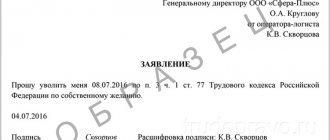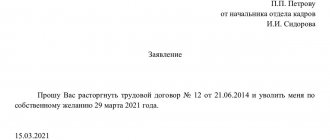Dismissal at the initiative of an employee is one of the most common reasons for dismissal in Russia. The reasons for terminating a contract with an employer can be different: an offer of a higher-paying job, a change of place of residence and other personal circumstances that the subordinate may not name.
An employer cannot refuse a subordinate his intention. Forced labor is prohibited in Russia. At the same time, when terminating a contract, there are some features and rules that must be followed.
Dismissal procedure
Termination of a contract on the initiative of a subordinate is simple to formalize. However, it is necessary to adhere to the following algorithm of actions.
Writing an application
First of all, the employee makes a decision about the upcoming dismissal from his position. The employee must express his intention by writing a statement (at home or at work). To complete the document, you will need a blank sheet of A-4 format. If your organization has a standard form, you can use it.
The paper is drawn up in the name of the head of the organization and must be signed and dated. The document must be handed over to the manager. If there are suspicions that the employer will not consider the application, it should be sent by mail with an inventory.
Attention
If a document is sent electronically, it must contain the employee’s electronic signature, which confirms that the document was drawn up by him.
The application should indicate the personal data of the employee, manager, reason (own desire), circumstances confirming the need for dismissal without service (if any), as well as a link to the law (Article 80 of the Labor Code of the Russian Federation), signature and date.
Sample application at your own request:
The HR department, having received the application, checks that it is filled out correctly, as well as the presence of the necessary details. After this, the paper is recorded in the journal for accepting incoming correspondence, and an order is drawn up.
Making an order
The personnel service, having received the application, draws up an order. If there are letterheads in the organization, you can use them, or fill out an order using the approved form T-8 (for the dismissal of one employee) or T-8a (for the dismissal of two or more subordinates).
Important
It is not recommended to start issuing an order immediately after the document has been approved by the manager. The employee can change his decision and, as a result, withdraw the document within 14 days. If this happens and the order has already been issued, it will be necessary to draw up a new order to cancel the previous one.
As a rule, filling out an order in an approved or free form is not difficult. The main thing is to avoid mistakes in the name of the person being dismissed, his position and structural unit (if any), as well as the date of termination of the contract.
For your information:
If the application says from January 20, then the order indicates January 19. If an employee asks to dismiss him on January 20, then the date is indicated in the order - January 20.
Example of a completed order:
The order is signed by the head of the organization and handed over to the employee for review under his personal signature. If the person being dismissed for some reason has not read the paper (on sick leave, on a business trip, on vacation), then a corresponding entry is made.
After signing the order and familiarizing the employee with it, a corresponding entry is made in the work book.
Full payment and issuance of documents
The dismissed employee receives documents, as well as a full payment on the last working day. Failure to comply with this rule is interpreted as a gross violation of the Labor Code of the Russian Federation.
First of all, a work book is issued. If it is not possible to hand it over personally, then it can be sent by mail or courier, having received the written consent of the employee.
In addition to the work book, the former employee must receive a certificate in form 2-NDFL, an extract from the SZV-M report, a medical book (if available), as well as documents confirming education and qualifications, if they were in the organization (certificate, diploma, certificates from educational institutions).
In addition to standard documents, an employee may request a number of other documents in writing:
- employment contract (despite the fact that a copy of the employee is given to him upon employment);
- certificate of salary and contributions to the Pension Fund;
- internal orders related to hiring, transfer to a position, to another department, dismissal.
For your information:
A former employee may request the listed documents in writing at any time after dismissal. According to Article 62 of the Labor Code of the Russian Federation, the employer is given three days to prepare the requested papers, which must be certified by the head of the organization and provided free of charge.
Application example
The Labor Code of the Russian Federation does not contain a clear form and rules for filing an application for dismissal at one's own request. However, this does not mean that the employee can write it at his own discretion. There are still some design standards. This follows from the basics of document management.
dismissal at will free of charge in word format
Thus, the application should include the following information:
- In the upper right corner, the employee must write the name of the manager, position and name of the organization. Below you should indicate the full name of the employee, as well as the position held,
- in the middle of the document the name is written: “application for resignation of one’s own free will”,
- Below is the essence of the application, where the employee asks to dismiss him at his own request, indicates the desired date of termination of the employment contract, makes reference to the norms of the Labor Code of the Russian Federation governing these legal relations,
- it is possible to indicate the reasons that served as the reason for termination of employment duties,
- The date of writing the application, the personal signature of the employee with a transcript is indicated.
As mentioned earlier, persons who have the right to quit without “working off” must indicate in the application one of the following reasons:
- in connection with reaching retirement age,
- in connection with admission to study at a university,
- in connection with the transfer of a spouse or both spouses to another position in another location,
- due to systematic violations by the employer of the terms of the employment contract and legislation towards employees.
Otherwise, the application form remains standard.
The employee submits the written statement to the personnel department, whose employees subsequently endorse it from the manager and issue a dismissal order.
Important! If the employer does not accept a personally submitted application for termination of the employment contract, then it is better to send the document by mail. Required with acknowledgment of delivery.
Terms of dismissal
Article 80 of the Labor Code of the Russian Federation states that a subordinate notifies the employer of his decision in writing two weeks in advance. However, if the parties reach a mutual agreement, the working period may be reduced or removed altogether.
The employer is obliged to release the employee from performing his job duties without a two-week warning period in the following cases:
- enrollment in an educational institution (full-time study);
- retirement;
- violation by the employer of legislation, local acts, collective and labor agreements.
- other cases:
- moving to another area;
- transfer of a family member (husband, wife) to work abroad;
- care for a child under 14 years of age, as well as for a disabled child or a sick close relative.
An employee undergoing a probationary period warns of his decision to stop working 3 days in advance (Article 71 of the Labor Code of the Russian Federation).
The head of an organization or a separate division, as well as his deputies, the chief accountant, are required to notify of their decision to resign in writing one month in advance.
Exemption from service without the consent of superiors

Labor Code in Part 3 of Art. 80 clearly establishes situations when an employee can leave the workplace without subsequent “working off”:
- retirement,
- admission to a university, but there is no information about the form of education.
The plenum of the RF Armed Forces in 2004 outlined another criterion that falls under circumstances in which it is not necessary to notify the employer in advance. This is a situation in which one or both spouses are transferred to work in another region or outside the Russian Federation.
What if the case does not fall under any of the above? It is necessary to try to achieve a common agreement with management, because the employee has no other choice.
If an agreement can be reached, the employee will be able to leave the place of work without “working off”. Otherwise, you will have to wait another 14 days or go to court if the reasons for dismissal are really compelling and can be considered “force majeure.”
There is another option: find out information about whether there were systematic violations of the terms of the employment contract on the part of the employer. If such a situation occurs, the employee has the right to quit one day.
However, violations must be documented in the instructions of the State Labor Inspectorate, the Prosecutor's Office, court decisions, and the conclusion of trade union committees.
Note! If there is no official document that would reflect the employer’s violations of labor laws in relation to employees, then it will not be possible to quit without warning.
Some employees time their dismissal to coincide with the start of their annual leave, or their final departure from work coincides with their stay on sick leave. These options exist, and, from the point of view of the law, the employee does not violate anything.
Thus, in order not to work in the next two weeks after submitting your application, you can:
- open a certificate of incapacity for work due to illness,
- if there are days off, then use them as days of “working off”,
- go on annual paid leave,
- go on parental leave for up to 1.5 (up to 3) years.
Let's consider each of the above cases in detail.
What payments are due upon voluntary dismissal in 2021?
What entry is made in the labor record?
The dismissal of an employee is accompanied by an entry in his work book. As a rule, filling out this document does not cause difficulties. A correct entry will not raise additional questions from either the tax or labor inspectorates.
Filling out the book when leaving at your own request occurs according to the following algorithm:
- The serial number of the record is indicated.
- The date of dismissal is indicated.
- The basis for dismissal is written, referring to the legislation (clause 3 of Article 77 of the Labor Code of the Russian Federation or Article 80 of the Labor Code of the Russian Federation).
- The details of the issued order to terminate the employment contract are recorded.
- The signature of the personnel service employee (the head of the organization), as well as the dismissed employee, is affixed upon receipt of the book, which indicates that the entry made is recognized as correct.
Important
It is unacceptable to make abbreviations in the work book. For example, writing paragraph 3 of Art. 77 of the Labor Code will be considered incorrect. All words should be written in full: paragraph 3 of Article 77 of the Labor Code of the Russian Federation.
Sample entry in the work book:
They don't sign the application. What to do
It’s a fairly common practice when a person wants to change a company for one reason or another, but they start putting spokes in his wheels: “there’s no director in place,” “let’s do it, I’ll sign it later,” etc. And after a while they refuse with the wording “there is no one to work”, “I do not consent to your dismissal”. Some are so dishonest that you can hear the answer “I didn’t see your application” and so on.
This is also important to know:
Dismissal of the chief accountant
To avoid these or other problems, it is enough to follow one of two scenarios:
- Write a written application and register it with the secretary or other authorized person.
- Send a registered letter.
The first option will be faster, because... the two-week period will begin the day after registration. The employer will not be able to later claim that he “did not see and did not know.” The duty of the secretary or other authorized person to notify the authorities as soon as possible.
With the option of sending through the Russian Post service, everything will take a little longer. The two-week period will begin on the day the employer receives the letter, not on the date it is sent. When the application has reached the addressee, it will be indicated in the notification, which means the employee will know the exact date of receipt.
After this, the director will have to release the employee. Clause 3 art. 77 of the Labor Code of the Russian Federation obliges us to do this.
Payments due upon dismissal
The dismissed person must receive all payments due to him on the day of dismissal. These include:
- salary;
- compensation for remaining vacation;
- allowances that are provided for in collective and labor agreements.
Attention
If a former employee took vacation in advance, then vacation pay is recalculated, and the excess amount is deducted from the calculated funds.
If a subordinate is not present at work on the day of dismissal and therefore does not receive full payment, he can claim it on any subsequent day. Also, money can be transferred personally or by transfer to a card. In the application, the employee can indicate a convenient way to receive payments.
Can an employer refuse to accept a resignation letter on its own?
Important
According to paragraph 1 and paragraph 2 of Art. 37 of the Constitution of the Russian Federation, labor is free. Failure by the employer to accept the application is regarded as a violation of current legislation.
The manager is obliged to accept the application. If there are suspicions in this matter, you can send a letter of resignation by mail with an inventory, and also take it personally to the department of the organization responsible for accepting correspondence. Thus, the employee will have confirmation that the manager has received his request.
For your information:
If the manager fails to act, the employee may file a petition in court to protect his rights.
What is it for
There are often cases when the employer is not against such dismissal. But he had no reason to do it himself. And then the employee himself brings such a letter of resignation under clause 3 of Art. 77 Labor Code of the Russian Federation.
Then after some time the employee announces that he has changed his mind. The director, knowing the legislation, says with joy on his face that “I understand everything, continue working.”
Free legal consultation
We will answer your question in 5 minutes!
Free legal consultation We will answer your question in 5 minutes!
Call: 8 800 511-39-66
Ask a Question
This is also important to know:
Dismissal of an employee of pre-retirement age
After a two-week period from the date of writing the application, a dismissal order is issued in accordance with clause 3 of Article 77 of the Labor Code of the Russian Federation - at one’s own request.
There is no use going to court. Legally, the director did everything correctly. One of the principles of law was at work here: “Most moral principles become legal norms, but not all.”
When refusing an application of your own free will, there is one very important nuance. If, from the moment the employee was fired until his refusal, a written invitation was sent to another person to accept this position, then it will no longer be possible to cancel it.
Here the law will be on the side of the future employee, i.e. someone who has already been invited. Because Now no one has the right to refuse him employment.
Therefore, it is necessary to weigh everything carefully before writing a letter of resignation. There are times when there is no way back.
Is it possible to withdraw an application?
Based on Article 80 of the Labor Code of the Russian Federation, an employee has the right to withdraw an application within a two-week period. This is possible if another person has not been accepted in writing to replace the subordinate and who, at the legislative level, cannot be denied employment.
If the date of dismissal is indicated before the end of 14 days, then the subordinate can withdraw the application before the deadline specified in the document.
For your information:
The application can be withdrawn both in writing and orally. However, it is recommended that you document your intention to continue working in your current position to avoid disputes.
The employee can make a corresponding entry on the application or send the employer a separate document notifying him of the withdrawal of the resignation letter.
Dismissal on sick leave
If an employee falls ill, he is obliged to notify his immediate supervisor. To reassure the employer, you can provide a certificate from your attending physician. A certificate of incapacity for work will subsequently be issued.
The employer does not have the right not to release the employee so that the latter has the opportunity to recover. After the employee has notified his superiors about the onset of his illness, he can write a letter of resignation.
If the certificate of incapacity for work is opened for 14 days or more, then “working off” will not be required. In this way, the employee will fulfill his obligations regarding advance notice of dismissal. An employer does not have the right to recall an employee from sick leave.
As for taking sick leave in connection with the upcoming birth and subsequent maternity leave, the situation is as follows.
Remember! The employee can announce his decision before submitting documents for maternity leave. He also has the right, while on parental leave, to communicate his intention to resign in writing.
Or you can initially apply for maternity leave and then write a letter of resignation.
The employer cannot prevent the start of leave related to pregnancy and childbirth, as well as child care, so dismissal during this period of time without “working off” is completely legal.
The nuances of dismissal
Dismissal of a subordinate at his own request is common for any organization. However, there are some features that should be taken into account by both the employee and the HR department.
On holiday
If there is unused leave, the subordinate has the right to take it with subsequent dismissal (Article 127). In this case, rest days will count towards working off.
Application example:
Attention
It is important to consider that if the employee changes his mind, the document can be recalled only before the start of the vacation period.
It is also possible to write a statement and then go on vacation any day with the approval of management.
On a sick leave
A subordinate can write an application for payment while on sick leave. In this case, the 14-day countdown begins from the next day after the application is submitted, and not the employee’s return to work.
Also, having expressed his desire to stop working, the employee, if necessary, can take sick leave. The countdown of days will also continue and settlement will occur on the specified day.
Important
If a subordinate, due to health reasons, was unable to appear at work on the day of release from his position, then the calculation still occurs.
On probation
An employee who is on a probationary period, having come to the conclusion that this type of activity is not suitable for him, notifies the employer about this within three days. The procedure is similar to standard voluntary dismissal.
The subordinate writes a statement in which he indicates his desire to stop working, puts a date and signature.
Upon retirement
Legislation guarantees the receipt of state benefits for persons who have reached retirement age. Thus, an employee can apply for termination of employment both at the time of retirement age and some time later.
The employer is obliged to issue documents, as well as make a full payment on the day specified in the application.
Important
The pensioner is not required to give notice of his intention within two weeks.
The paper is drawn up in free form, however, the reason for dismissal should be indicated as the inability to carry out further work activities in connection with retirement.
Other cases
In addition to the listed cases, there are a number of others when a subordinate resigns of his own free will.
- Student. The student can terminate the contract with the employer at any time. The application indicates the date of termination of work, and also attaches a supporting document (for example, a certificate of enrollment in an educational institution).
- A woman on maternity leave. An employee who is on maternity leave, as well as to care for a child until he or she reaches the age of three, can apply for dismissal in the standard manner, giving two weeks’ written notice of her decision. Termination of the employment contract with such an employee is formalized in the standard manner. Within a two-week period, the employee has the right to change her mind and withdraw the document.
- An officer. For an officer to terminate a contract, there must be valid reasons. The legislation does not provide a list of them. It is understood that the officer has circumstances that make his further service in the RF Armed Forces impossible. The serviceman must submit a report of dismissal and attach documents confirming the need for early termination of the contract. The certification commission, together with the commander, will consider the officer’s petition, recognizing his reasons as valid or not, followed by dismissal.
- Disabled person. The process of dismissing a disabled person is no different from the standard one. The application is submitted 14 days in advance, after which the work period begins. Dismissal of a disabled person usually occurs in two cases:
- The decision was made by a person who has been disabled for a long time. Perhaps he needs time for treatment or rest.
- An employee who has just received disability intends to terminate the contract. Perhaps he cannot continue to perform his previous job responsibilities, or this type of work is no longer suitable for him.
- Because of the move. A person can resign on his own due to relocation. The paper is drawn up in free form, the date of the desired termination of the contract is indicated. The employer may agree with it or require two weeks of work. If processing is not possible, then supporting documents should be attached.
Question No. 1
According to clause 3, part 1, art. 77 of the Labor Code of the Russian Federation, the basis for termination of an employment contract is termination of the employment contract at the initiative of the employee (Article 80 of the Labor Code of the Russian Federation).
In accordance with Part 1 of Art. 80 of the Labor Code of the Russian Federation, an employee has the right to terminate an employment contract by notifying the employer in writing no later than two weeks in advance, unless a different period is established by the Labor Code of the Russian Federation. How to determine the duration of the dismissal period in this case?
The notice period for termination of the employment contract (two weeks) begins the day after the employer receives the employee’s resignation letter (Part 1, Article 80 of the Labor Code of the Russian Federation).
By virtue of Part 3 of Art. 84.1 of the Labor Code of the Russian Federation, the day of termination of the employment contract in all cases is the last day of work of the employee, with the exception of cases where the employee did not actually work, but in accordance with the Labor Code of the Russian Federation or other federal law, his place of work (position) was retained.
Based on Part 4 of Art. 14 of the Labor Code of the Russian Federation, if the last day of the period falls on a non-working day, then the day of expiration of the period is considered to be the next working day following it.
Article 14 of the Labor Code of the Russian Federation establishes that the period with which the Labor Code of the Russian Federation associates the termination of labor rights and obligations begins the next day after the calendar date that determines the end of the labor relationship.
In accordance with Part 5 of Art. 80 of the Labor Code of the Russian Federation, upon expiration of the notice period for dismissal, the employee has the right to stop working. On the last day of work, the employer is obliged to issue the employee a work book or provide information about work activities with this employer (Article 66.1 of the Labor Code of the Russian Federation), issue other documents related to work, upon the written application of the employee, and also make a final settlement with the employee.
Based on Part 1 of Art. 140 of the Labor Code of the Russian Federation, upon termination of an employment contract, payment of all amounts due to the employee from the employer is made on the day of the employee’s dismissal. If the employee did not work on the day of dismissal, then the corresponding amounts must be paid no later than the next day after the dismissed employee submits a request for payment.
Thus, the warning period for termination of an employment contract in the event of dismissal of an employee on his own initiative begins on the day following the submission of the relevant application and ends on the last day of the expiration of the two-week period, when the employer is obliged to take the necessary actions to formalize the termination of the employment contract.








